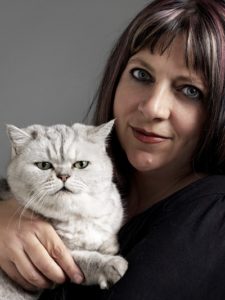 Leigh Shenker
Leigh ShenkerBADA (Hons)(WITS), DipCABT (COAPE) OCN, CABTi Practitioner
Leigh’s studies and career path started in the field of human behaviour, working primarily with youth at risk. Her love of four legged creatures led her to change direction towards all things related to animal behaviour, and she completed her Diploma in Animal Behaviour through COAPE International.
Leigh is a qualified Practitioner member of CAPBT. She has a special interest in natural medicine for animals and grows and sources many unusual medicinal plants.
As the Marking Manager, she forms part of the COAPE management Team. When not lecturing, tutoring and marking the COAPE Diploma, Leigh spends most of her time involved in shelter work and working with clients.
Her dedication to shelter work is reflected in several programmes and systems she has set up, and she is committed to changing the traditional model for animal shelters and improving basic conditions for all animals, as well as assisting families who choose to adopt a rescue.
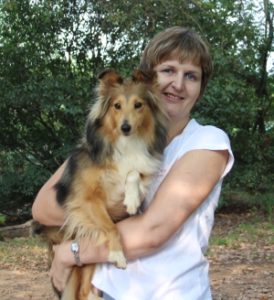
DipVetNurs, DipCABT(OCN).
Carla had a great passion for all animals since youth so after school she decided to study veterinary nursing at the Faculty of Veterinary Science, University of Pretoria. For the past 13 years she has been the senior veterinary sister at the Small Animal Medicine department and subsequently moved to the Outpatients/ Emergency ward where she is involved in student training, assisting with procedures, emergencies and ensuring the daily smooth running of the clinic.
Carla always had a special interest in animal behaviour and completed a Technikon certificate in basic animal behaviour in 2002. In 2004 she completed her Advanced Animal Behaviour course. She also completed workshops on clicker training and puppy classes. Carla holds the OCN UK accredited Diploma through the Centre of Applied Pet Ethology. Carla consults after hours and assists the Veterinary behaviourists at Onderstepoort with behavioural research.
Educating owners about their pet’s behavioural needs is a huge passion for her and she is continuously looking for opportunities to improve her knowledge through attending CPD veterinary congresses and courses.
Carla heads up the Beginner and Intermediate courses marking department as well as marking and moderating these course assignments.
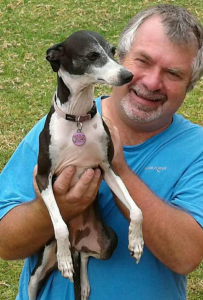
DipCABT, CABTi Practitioner member
George’s life experience with dogs began in 1988 when he begun training his first dog. He started with club obedience and then moved onto agility training. Unfortunately, George did not have the knowledge that he does now and trained with the outdated methods of that era.
George became hooked on training and agility and obtained four more dogs! He did very well and Flash (his first dog) went on to C class obedience (top class at that time) and won many obedience club competitions. Flash also did very well in agility and went from Grade One Agility to Grade Three in just over a year. Together they won the Millennium Interprovincial Championships in 2000 and qualified for the World Championships in 2001. Blue, one of George’s other Border Collies, placed second at the SA Championships.
When George’s dogs became too old to compete; both him and the dogs went into retirement. In 2014, he decided to get another dog, and he, of course, started training. After being out of the training world for a while he decided to investigate if there were any new training methods. He read some articles and wanted to know more.
George enrolled in his first training course in 2015, offered by Dr. Ian Dunbar, and found it very interesting. He then joined the Dunbar Academy and was one of the founder members of the Academy at that stage. His new dog had some strange behaviours, which started him on his journey of animal behaviour. George enrolled in JD courses and did short animal behavior and animal psychology courses. As they were short courses, they did not cover enough in-depth animal behavior, so he enrolled in the Pet Sense Canine Behaviour, and Training course. This led him to COAPE International where he enrolled and graduated in 2019 with the COAPE Diploma in Animal Behaviour.
George currently runs puppy classes, offers behaviour consults, as well as being busy with various dog-related projects. He also provides lectures for shelters or anybody interested in learning more about their pets. He is a force-free trainer and very passionate about animals and the education of people regarding the new science behind animal training and behaviour.
George tutors and marks the Diploma in Animal behaviour, as well as presenting the popular Dog Training Add-On course course for COAPE International.
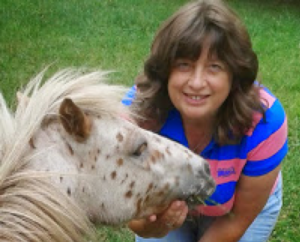
QTLS, RVN, Dip CABT, CABP, MAPDT, CABTi Practitioner member
Jo graduated with her COAPE Diploma in Companion Animal Behaviour in 1999 and worked for Cedar Veterinary Group for 25 years, initially as head nurse and then from 1994-2008, as a full-time professional referral pet behaviour therapist and dog trainer. During this time Jo qualified in clinical small animal nutrition, a subject she has always been interested in. Jo then achieved her teaching qualifications whilst working full time as Course Tutor in animal behaviour, animal care and veterinary nursing at Kingston Maurward College. She went on to combine all her qualifications by returning to practice for Springbok Veterinary Group in Dorset where she was Principal of the South Coast Hydrotherapy School. She then moved to an exotic referral practice at Piddle Valley Vets as RVN, Animal Behaviour Therapist and trainer, and was in charge of nurse training.
Jo writes books and articles on companion animal behaviour, pet first aid on which she also runs courses. She spends the rest of her time with her family and growing menagerie of dogs, cats, ferrets, ponies and her beloved horse, Gentleman Jim.
Jo marks ThinkBehaviour, ThinkNutrition and the Diploma for COAPE International.
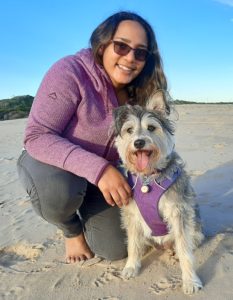
MTech (Nature Conservation), DipCABT (COAPE)
Taryn’s interests for animal behaviour started during high school when she spent time as a volunteer at the Cape of Good Hope (CoGH) SPCA in Cape Town. So much so, that she spent her holidays whilst studying towards Nature Conservation, as a temporary animal care assistant. Whilst in this role at the SPCA, as well as during her studies, Taryn learnt the importance of animal behaviour and education, all steps that would later lay the foundation of her future career in companion animal behaviour and training.
With the completion of a master’s degree in Nature Conservation, Taryn became a lecturer in conservation and marine science. However, whilst in this role, she decided it was time to further pursue her interest in animal behaviour and training and so went on to complete the ThinkingPets Confi-Puppy course. During her studies in the course, Taryn became involved as a part-time assistant at a local dog training school. Taryn’s passion for companion animal behaviour and training truly peaked under the mentorship of some of COAPE’s finest behaviourists and trainers. As a result, she then decided to further her studies within companion animal behaviour and found time to complete the COAPE CO1 course. Taryn enjoyed the CO1 course so much that she enrolled for the COAPE Diploma in Companion Animal Behaviour immediately thereafter. Whilst completing shelter hours towards the diploma, Taryn went back to the SPCA on weekends to apply her newfound skills as a volunteer, where she enjoyed working with and learning from the current (COAPE) behaviourist about the application of her studies to animals in welfare situations, and to give back to the SPCA that had given so much to her.
Taryn has since relocated to Port Elizabeth where she is working as a full-time companion animal behaviourist and trainer, she is a CAPBT and ICAN member.
Taryn marks the DogWise course for COAPE International.
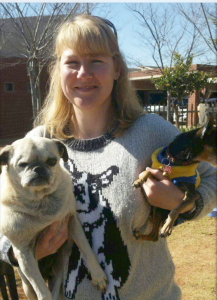 Renee Venter
Renee Venter BSc Zoology, DipCABT, CABTi Practitioner member.
Reneé qualified with a BSc in Zoology, but her passion for dogs and cats, their behaviour, nutrition, medical care and general wellbeing urged her to study further, and lead to her obtaining her COAPE Diploma in Animal Behaviour in 2019.
Reneé is currently one of the trainers at Greenside Headstart Puppy School, as well as offering her knowledge to owners in private consultations, addressing various problem behaviours in companion animals.
Renee tutors and marks the DogWise course for COAPE International.
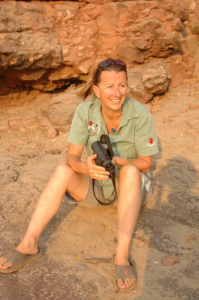
B.Ed
Originally hailing from the UK, Wendy Collinson-Jonker gained her Bachelor of Education in 1990 and spent 15 years teaching Physical Education in the east end of London to high school students. She moved to South Africa in 2005 and began her work in conservation as a research assistant with the Endangered Wildlife Trust (EWT). She immersed herself in a number of carnivore research projects, specifically the African Wild Dog, where she then wrote the C05 course for COAPE in 2011.
It was while undertaking research on the African Wild Dog, that she observed many animal road mortalities. Deeply concerned by this, Wendy used her own time and resources to conduct pilot studies to ascertain the extent of roadkill. Some alarming statistics came to light, showing that roads may detrimentally impact biodiversity. For example, 10 African Wild Dogs were killed on the roads in her study area over a three-month period. With approximately 450 African Wild Dogs left in South Africa, this charismatic and endangered species may further be at risk from roads.
Wendy completed her Masters Degree at Rhodes University, Grahamstown, South Africa in Road Ecology – examining the impacts of roads on South African wildlife. This then led to Wendy’s current career, where she leads the EWT’s Wildlife and Transport Programme – driving initiatives that address the now-recognised threat of roads in South Africa. She is coordinating numerous research projects that examine the impacts of roads in South Africa, and ultimately finding solutions to reduce roadkill. Many of her projects involve collaborations with relevant stakeholders in the transport sector as well as academia, regarding the design of future projects. Through the data collected over time it will identify patterns and trends of where wildlife-vehicle collisions are most common. This in turn, will assist with preventing roadkill and the resulting impact on biodiversity, and will see an improvement in human road-safety by saving lives, minimising disruption (due to road closures) on routes, and potentially reducing insurance claims by millions of rand each year for repairs to vehicles involved in a wildlife-vehicle collisions.
Since 2014, Wendy has published 14 scientific papers in peer reviewed journals and given over 50 presentations at both national and international conferences.
Wendy would like to acknowledge input into the making of the African Wild Dog course to Harriet Davies-Mostert (Head of Conservation, Endangered Wildlife Trust), Professor Peter Neville and Katherine Potgieter.
Due to the very specialised nature of the African Wild Dog Behaviour course, Wendy tutors and marks it for COAPE International.
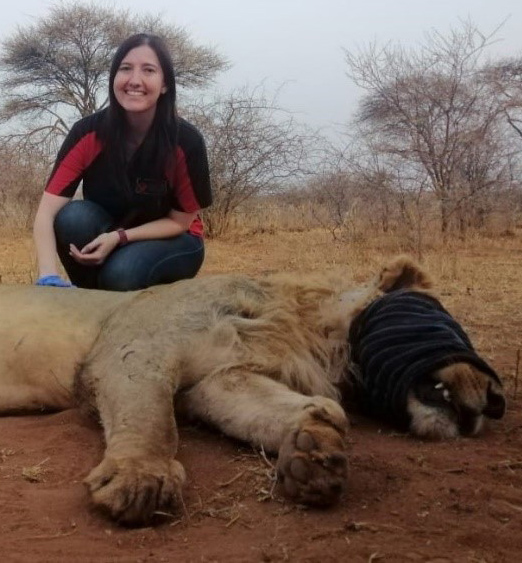
BSc (Hons), MSc| Rhodes University
After completing her Zoology and environmental science undergraduate degree, Sam obtained the zoology MSc thesis in April 2014 through Rhodes University. Her thesis modelled the feasibility of a reintroduction of wild dogs into the Great Fish River Nature Reserve in the Eastern Cape, South Africa. Her thesis further completed a threat analysis of the surrounding area for wild dogs.
Following the completion of her zoology degrees, Sam began working as a conservation science intern at the Endangered Wildlife Trust (an NGO based in South Africa). She then went on to become a science officer in the Wildlife and Energy Programme at EWT where she managed a database that recorded wildlife mortalities on power infrastructure. Using this database, she would work with Eskom (the power utility) to mitigate those lines that had previous mortalities to ensure that no other mortalities would occur.
Sam always had a passion and interest for carnivore conservation and so, in 2018 she embarked on her current role in the position as the co-ordinator of the African Lion Database (ALD). The ALD is an exciting project that aims to consolidate all lion population and distribution data from across the continent. This data will be used to generate up-to-date distribution maps for the species and provide reliable estimates on lion populations in Africa. In this role, Sam published several sub-chapters in the Guidelines for the Conservation of Lions in Africa (specifically on the ALD, lion population and distribution)
In addition, Sam has published a number of scientific papers for international peer-reviewed journals on carnivore species including cheetah, lion and wild dog.
Due to the very specialised nature of the African Lion Behaviour course Sam tutors and marks it for COAPE International.
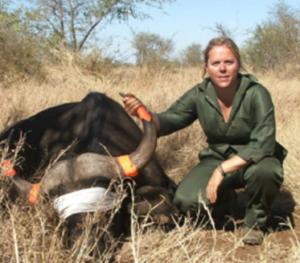
Kath has been involved with environmental research, conservation, and project management since 2003. Her primary interests encompass the incorporation of behavioural research into understanding evolutionary drivers of disease transmission, infection mechanisms and disease control efforts. A background researching endangered carnivores and mega-herbivores has emphasised the need for continued research and monitoring of key species, systems and natural processes on this ever-changing planet for Kath.
Kath began her career researching African wild dogs with the Endangered Wildlife Trust and, having spent countless hours tracking, observing, communing, and growing as a conservationist and scientist with the wild dogs for the better part of a decade, will always consider herself a “dog-girl”. This time with the wild dogs also allowed Kath to pursue research interests in other large carnivores, including African lion and cheetah.
In 2014 Kath’s research focus shifted from animals with teeth and claws to those that are often the fodder of carnivores, when she joined a dynamic, collaborative team researching Foot and Mouth Disease Virus in African buffalo. She was elected to manage the project in the Kruger National Park until it wrapped up in 2019. Collaborative projects, like this one, provide one with perspective and insight with regard to a “bigger picture” approach to conservation where animals, humans and the environment all need to considered holistically in order to make any meaningful, impactful contributions to the field.
Kath’s work on the buffalo project led to a position as a research fellow in the Department of Veterinary Tropical Diseases at Onderstepoort in 2020 until she joined the faculty at the School of Biology and Environmental Science at the University of Mpumalanga.
Kath has published in various scientific journals on carnivore behaviour and management, behaviour and health in African buffalo and scientific method. She also compiled the African Wild Dog Compendium on behalf of the Wild Dog Advisory Group and was a contributing author of the South African Good Practise Guidelines for Surveying Bats at Wind Energy Facility Developments.
Kath has written our latest speciality wildlife course, Cheetah behaviour. This course enables the learner to understand the subtler aspects of cheetah behaviour and some of the threats being faced by this magnificent species, which places them on the IUCN’s ‘Vulnerable’ list. With her years of experience, Kath is the perfect person to also tutor and mark this course.
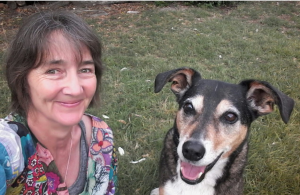
MSc (Entomology), CertCAB, Guild certified TTouch Practitioner, DipCABT (COAPE) OCN
Judy grew up with a great passion for all creatures great and small, so after school she naturally progressed to completing a degree in Zoology and Entomology. After her studies she took a break from her books and followed her love for animals, working as a veterinary nurse at the Cape of Good Hope SPCA for a year. She then went back to her studies to become a Research Entomologist, working for the Agricultural Research Council for many years.
Her passion for working with animals prompted Judy to enrol for the 3-year TTouch Practitioner’s course in South Africa in 2007 and she qualified as a TTouch Practitioner in September 2009. Judy went on to complete the COAPE DogWise Stage 1 course with distinction in 2010, and then completed her OCN UK COAPE Diploma in 2014. Judy is a qualified ThinkingPets Puppy and Kitten School Instructor and is also the co-owner of DogHub SA, a highly successful dog training school and behaviour consultancy in Cape Town, South Africa. Judy formed part of the Diploma lecturing team in Cape Town, and she consults regularly on all aspects of animal behaviour and training.
Judy marks the Diploma in Animal behaviour, the Diploma in Dog behaviour, DogWise, ThinkCat and ThinkBehaviour courses.
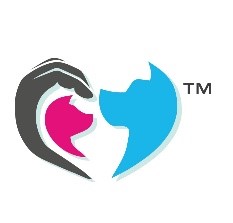
© 2021 COAPE | Images by Moose